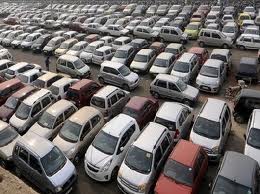When you're in the market to buy a used car, it's essential to consider the additional costs beyond the sticker price. While it's clear that the purchase price is the most prominent expense, there are other fees and expenses that you should be aware of before signing a deal. Being aware of these costs helps you get a clear picture of the total investment you'll be making and ensures that you stay within your budget.
Some of the additional costs associated with buying a used car include sales tax, registration fees, and insurance. These expenses can vary, depending on the make and model of the car, as well as your state and local regulations. For example, registration fees can range from less than $50 to over $200, while sales tax rates differ from state to state.
Besides taxes and fees, you may also encounter hidden finance costs such as a higher interest rate or other lender fees when obtaining a loan for your used car. It's crucial to take the time to research and understand these costs so that you can budget accordingly and avoid unwanted surprises.
Identifying the Costs
When you're buying a used car, it's essential to be aware of the various costs involved, apart from the purchase price of the vehicle. Some of these expenses include:
- Sales tax: Depending on your state, you'll need to pay a certain percentage of the car's purchase price as sales tax.
- Registration fees: Registering your newly acquired used car comes with a fee. This cost varies from state to state, typically ranging from $50 to over $200.
- Documentation fees: Dealers may charge you a fee for processing the paperwork related to the car purchase. These fees can run between $50 and $600 and may be negotiable.
- Dealer fees: Some dealers might include additional fees, such as "shipping and handling," "dealer prep," or "advertising." It's a good idea to discuss these fees with the dealer as they can often be negotiated away.
- Reconditioning fees: Some used car dealers charge a reconditioning fee to cover any repairs or improvements they made to the car before selling it. This fee can vary but is another cost you should factor in.
Before completing your used car purchase, you should also consider investing in a vehicle history report. This report can provide valuable information about the car's past, such as accident history or potential title issues, giving you added peace of mind in your decision.
It's important to have a clear understanding of these costs when buying a used car so that you can budget accordingly and avoid any unpleasant financial surprises. Keep these factors in mind as you shop around, and you'll be better prepared to make an informed decision.
Purchase Price and Negotiations
When you're buying a used car, understanding the purchase price and how to negotiate effectively is essential. Start by researching the Kelley Blue Book value, which provides a reliable estimate of a vehicle's current market value based on its make, model, age, and condition. This information is helpful as a starting point for negotiations, as it gives you an idea of what the car is really worth.
As you negotiate the purchase price, keep in mind that dealers often list the used cars at a higher price than their actual value. Don't hesitate to make an offer below the asking price. Also, remember that while the MSRP (Manufacturer's Suggested Retail Price) can be a helpful reference point, it's usually not as relevant to used car pricing as the car's Blue Book value.
During negotiations, pay attention to the finer details of the deal. While dealers may offer tempting incentives like low monthly payments or rebates, these options may come with longer loan terms or higher interest rates. Carefully evaluate each aspect of the deal to ensure you're getting the best possible outcome.
When discussing payment options, be confident and knowledgeable but maintain a neutral tone. If you feel that the dealer's offer is too high, calmly state your reasoning and counter with a fair price based on the available information. If necessary, be prepared to walk away from the deal; sometimes, this tactic can lead to a better offer from the dealer.
In summary, to negotiate the best purchase price for a used car, use the Kelley Blue Book value as a starting point, consider the impact of low monthly payments and rebates on the overall cost, and be confident in your approach—your clear and knowledgeable stance can have a significant impact on the final price.
Dealer and Documentation Fees
When you're in the process of buying a used car, it’s essential to understand the additional costs involved apart from the vehicle's price. One such crucial aspect is dealer and documentation fees. These fees are charged by dealerships to cover various expenses related to the car buying process.
Documentation Fee: This fee, also known as the "doc fee," is charged by the dealer to cover the cost of preparing and filing all the paperwork for the sale. While some states set limits on the doc fee—such as California, which caps it at $85—others have no limit. In such states, this fee can go up to $600 or even higher.
Dealer Prep Fee: Dealers may also charge a dealer preparation fee, which is meant to cover the costs of getting the car ready for sale. This can include cleaning, vehicle inspection, and minor repairs. The price for this fee can vary depending on the dealership and the specific services they provide.
Advertising Fees: Dealerships often pass on the cost of advertising their inventory to the buyers. Advertising fees are charged to cover the dealer's marketing expenses, such as running ads in print, radio, or online media. These fees may range from a flat fee to a percentage of the car's price.
Keep in mind that dealer fees can differ from one dealership to another, and some dealers may even charge additional fees for services like loan or lease processing. It's essential to carefully review the breakdown of these fees, and don't hesitate to discuss the fees with the salesperson or negotiate to reduce them.
By understanding the dealer and documentation fees involved in buying a used car, you can better anticipate the true cost of the car and ensure a smoother purchasing experience.
Registration, Title, and Licensing
When you purchase a used car, there are additional costs apart from the purchase price. These costs include registration, title, and licensing fees. It's essential to familiarize yourself with these fees so you know what to expect when budgeting for your used car purchase.
Registration is the process of officially adding your vehicle to the state's records, typically managed by the Department of Motor Vehicles (DMV). Registration fees vary by state and can range from under $50 to over $200. In most cases, dealers handle the vehicle registration fees when you buy a car from them, making the process more convenient for you.
Title refers to the legal document proving your ownership of the vehicle. Transferring the title from the previous owner to you is a crucial step in the used car buying process. Make sure to check the information on the title matches the actual car, such as the make, model, and Vehicle Identification Number (VIN). Title and registration fees can be combined or separated, depending on the state, so keep that in mind when budgeting for your purchase.
Licensing primarily refers to the cost of obtaining a license plate for your vehicle, which is mandatory for driving on public roads. The cost of this service varies by state and often depends on factors such as the vehicle's weight, age, or fuel type. Keep in mind that some states require annual registration and renewal of license plates, while others may have biennial or longer intervals.
To sum up, when buying a used car, expect to pay additional costs for registration, title, and licensing of the vehicle. These fees vary by state, so be sure to consult your local Department of Motor Vehicles or check their website for specific information related to your location. By taking these extra fees into account, you'll be better prepared to budget for your used car purchase.
Taxes Involved
When you buy a used car, there are various taxes that you need to be aware of and consider in the overall cost. One of the primary taxes involved in a used car purchase is the sales tax. This tax is applied to the purchase price of the vehicle and varies by state. In some cases, the sales tax might be applied to the full purchase price, while in others, a trade-in car may grant you a tax break.
Another tax you might encounter is the vehicle registration fee. This fee covers the cost of registering the vehicle, issuing a title, and obtaining license plates for your car. The registration fee also varies by state, with some charging a flat rate and others calculating the fee based on the vehicle's size or value. For example, states like Wisconsin have a base registration fee of $75, while Florida's initial registration fee in 2017 was $225 plus an additional charge based on the vehicle size.
In addition to these primary taxes, there are other fees associated with purchasing a used car, such as the documentation fee. This fee is charged by the dealer to cover the cost of preparing and filing the sale documents. The documentation fee varies between dealerships and states but is another cost to factor in when purchasing a used car.
In conclusion, when purchasing a used car, it is crucial to be aware of all the taxes and fees involved. Sales tax, vehicle registration fees, and documentation fees are just a few of the expenses you may encounter. By understanding these costs, you can better prepare for the total expense of your used car purchase and make a more informed decision.
Insurance and Warranty
When buying a used car, it's essential to consider both insurance and warranty options to protect your investment. Ensuring you have the right coverage in place can save you money and provide peace of mind.
Car Insurance: Before driving your used car off the lot, you'll need at least the minimum car insurance coverage required by your state. The cost of your insurance premium will depend on factors such as where you live, the make and model of the used car, and your driving history. It's a good idea to shop around and compare quotes from multiple insurance providers to find the most competitive rate.
Warranty: Most used cars come with some form of warranty, typically a limited warranty covering specific components or a time period. It's crucial to carefully review the warranty terms and understand exclusions, deductibles, and the duration of coverage. Additionally, some dealers or sellers offer extended warranties for an additional cost, providing added protection against unexpected repairs and increasing the lifespan of your used car.
Extended Warranty: An extended warranty can offer you additional protection beyond the initial warranty provided by the seller. While it can be an added expense, it may be worth considering if you're concerned about potential repair costs or if your used car doesn't come with a comprehensive warranty. Keep in mind that pricing and coverage can vary, so always read the fine print and make an informed decision based on your needs.
Gap Insurance: If you're financing your used car, you might be interested in gap insurance. This type of insurance covers the difference between the remaining loan balance and the car's actual value if it's deemed a total loss due to an accident or theft. While not required, gap insurance can be a valuable safety net, especially if you're concerned about being underwater on your car loan.
By considering the insurance and warranty options available to you when purchasing a used car, you can protect your investment and ensure you're adequately covered in case of unexpected events. While costs may vary, finding the right balance of coverage will help keep both your car and your finances in good shape.
Financing the Used Car
When buying a used car, financing is an important aspect to consider. It's vital to understand the different elements involved in the financing process, such as interest rates, car loans, down payments, and monthly payments.
Interest Rates: The interest rate on your used car loan can greatly impact the overall cost of the vehicle. A lower interest rate means lower monthly payments, and thus, lower total cost in the long run. To find the best interest rate, it's essential to shop around and compare offers from several different lenders.
Car Loans: Used car loans are a popular way to finance your purchase. To secure a loan, you typically need to have a decent credit score and a stable financial background. Be sure to compare interest rates, terms, and conditions from multiple lenders before committing to one. Keep in mind that the longer the loan term, the more interest you'll end up paying.
Down Payment: A down payment is the initial sum of money you pay upfront when purchasing a used car. This amount will be subtracted from the total cost of the vehicle, and the remainder will be financed through a loan. The larger your down payment, the lower your monthly payments and overall cost of the car will be. However, it's important not to deplete your savings when making a down payment.
Monthly Payments: Your monthly car payments are calculated based on the loan amount, interest rate, and loan term. To keep your monthly payments manageable, you can opt for a longer loan term or lower interest rate, but this may result in higher total costs over time. Be sure to consider your budget and financial goals when determining the ideal monthly payment.
By understanding these financing components and being proactive with your research, you'll be well-prepared to make informed decisions when purchasing your used car. Remember, the goal is to find a financing plan that aligns with your personal financial situation and preferences.
Trade-In and Other Deductions
When you're purchasing a used car, there are various ways to save money through trade-ins and other deductions. Understanding these processes can help you make the most of your investment and reduce the overall cost of acquiring a new vehicle.
One popular strategy is trading in your existing car. A trade-in is when you exchange your current vehicle for a credit towards purchasing a new one. This credit effectively lowers the price of the new car and reduces the sales tax you'll pay. The value of the trade-in depends on several factors, such as the make, model, condition, and age of your vehicle. To get the most value out of your trade-in, make sure your car is well-maintained and in good condition.
Another way to save money when buying a used car is taking advantage of available deductions and incentives. Many dealerships and manufacturers offer rebates, cash-back offers, or low-interest financing options to encourage sales. Research any incentives that may apply to the particular make and model you're considering, and don't be afraid to negotiate with the dealership to secure the best deal possible.
Keep in mind that when buying a used car, there may be additional fees and taxes involved. For example, sales tax, registration fees, and title transfer fees are typically required. However, a trade-in can help offset some of these costs by reducing the taxable amount on the vehicle's purchase.
In summary, trading in your old car and seeking out deductions can lead to significant savings when buying a used vehicle. By familiarizing yourself with these strategies and being proactive in your research, you'll be better equipped to get the most value for your money.
Hidden Fees to Be Aware Of
When buying a used car, it's essential to be aware of any hidden fees that can significantly impact your budget. Some of these may be negotiable, so do your research and ask questions when dealing with a dealership or private seller.
Destination Fees: This is the cost to transport the vehicle from the manufacturer to the dealership, which can range from a few hundred to over a thousand dollars. Be sure to ask if this fee is included in the price or if it is an additional cost.
Conveyance Fee: Also referred to as the dealer fee or doc fee, the conveyance fee covers the dealership's cost for processing paperwork related to the sale. These fees can run anywhere from $50 to $600, and some states have caps on how much a dealer can charge. Ask if this fee is negotiable to potentially save some money.
Reconditioning Fee: Reconditioning is common when buying a used car, as it covers the cost for the dealership to clean and make any necessary repairs or improvements before selling the vehicle. This fee can range from a few hundred to over a thousand dollars, so be sure to inquire about this cost and whether it's included in the advertised price.
Preparation Fee: Some dealers may try to slide in a fee that's supposed to cover the cost of getting a car ready for sale, called a dealer preparation or dealer prep fee. Be sure to ask about this fee and if it's already included in the price or can be challenged.
When reviewing the out-the-door price for a used car, always make sure to read the fine print in the contract so that you understand all fees, taxes, and additional costs involved. By knowing what hidden fees to look for and asking the right questions, you'll be better equipped to make an informed decision on your used car purchase.
Long Term Costs
When considering the purchase of a used car, it's essential to factor in the long term costs associated with car ownership. Two of the main long term expenses include maintenance and fuel costs, both of which can greatly impact your overall budget.
Maintenance is an inevitable aspect of any car ownership, but with a used car, you may expect more frequent and potentially costly repairs. To minimize unexpected costs, it's crucial to keep your vehicle well-maintained. Regular oil changes, tire rotations, and replacing worn parts like brakes and belts will contribute to the longevity of your car. Keep in mind that older or high-mileage vehicles may require more significant repairs, such as replacing the transmission, exhaust system, or suspension components. Therefore, it's essential to budget for ongoing maintenance costs to avoid unpleasant surprises down the line.
Fuel is another significant expense to consider when buying a used car. While newer vehicles tend to be more fuel-efficient, it doesn't necessarily mean that used cars will drain your wallet at the pump. Research the fuel economy of the specific make and model you're interested in purchasing, and factor in your driving habits. For example, if you have a long daily commute or frequently engage in stop-and-go traffic, a used car with better gas mileage might be a more cost-effective choice in the long run.
In summary, as you weigh the pros and cons of purchasing a used car, it's crucial to account for long term costs, such as maintenance and fuel. By being proactive about routine maintenance and considering the fuel efficiency of your prospective vehicle, you can make an informed decision and face fewer financial burdens throughout your car ownership experience.





